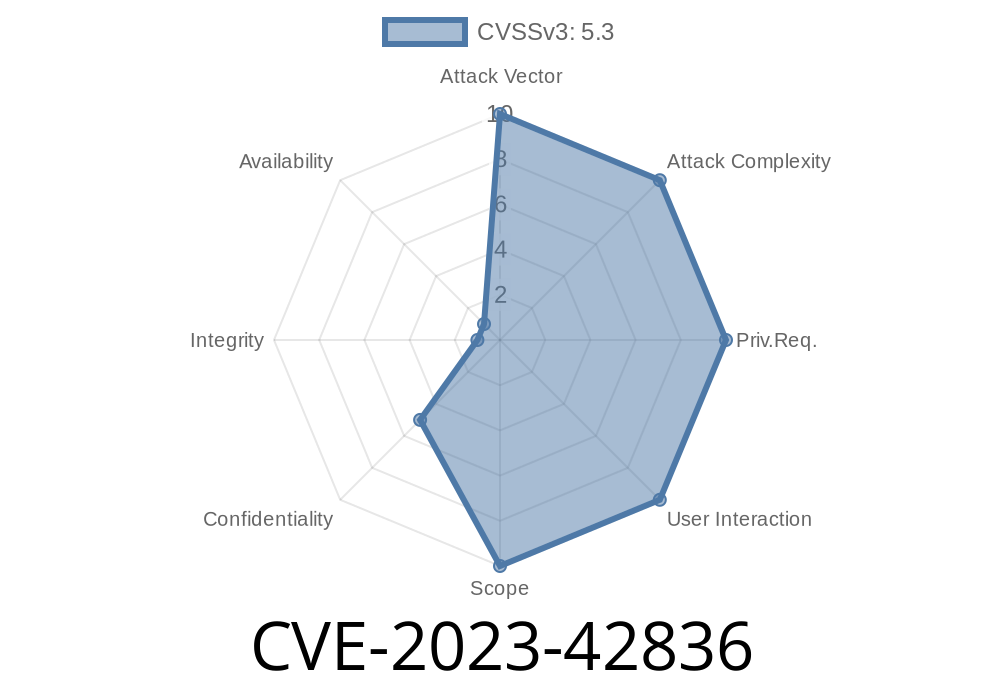In October 2023, Apple patched a high-profile vulnerability, CVE-2023-42836, that affected a range of its platforms, including iOS, iPadOS, and macOS. The vulnerability stemmed from a logic flaw that careless checks in the handling of mounted network volumes inside user home directories allowed attackers to potentially access sensitive data. This post breaks down what the issue was all about, includes code snippets to help you understand the exploit, gives the context for why it matters, and shows where to find more information.
What is CVE-2023-42836?
CVE-2023-42836 is a logic issue in Apple’s operating systems that allowed a local attacker to access mounted network volumes from inside a user's home directory—volumes they shouldn’t have access to.
> Apple’s Description: "A logic issue was addressed with improved checks. An attacker may be able to access connected network volumes mounted in the home directory."
This means if someone was able to run code on your device (think malware or a rogue app), they could peek at shared folders or drives connected via your network, assuming these were mounted inside your home directory.
macOS Monterey 12.7.2
If you haven't updated, you could still be vulnerable.
Understanding the Logic Issue
When you connect to a network share (like an SMB or AFP drive), macOS typically "mounts" (attaches) it somewhere on your computer’s filesystem. If that place is in your home directory (like /Users/alice/NetworkDrive), the operating system is supposed to protect it from being read by other users or processes without the right permissions.
But Apple’s code had a logic flaw: the system failed to properly enforce access rules for these "mounted" volumes. That means if you or an app connected to a network volume, it might be possible for another process (possibly running with lower permissions) to browse or copy files from that share.
What Went Wrong: A Simple Diagram
/Users/alice <-- Home Directory
└── Documents/
└── NetworkDrive/ <-- Network Volume (mounted)
Expected: Only Alice and trusted processes can see inside NetworkDrive/.
Issue: Any local attacker with user-level access can explore NetworkDrive/, by bypassing some permission checks.
How the Exploit Worked (with Code)
Let’s look at a simple proof-of-concept in Python, which simulates how an attacker could list or copy files from a mounted network directory inside a user's home folder:
Suppose the mounted path is: /Users/victim/NetworkShare
If your malicious program is running as the same user (or can escalate privileges), it could do something like:
import os
# Path to the mounted network volume inside victim's home directory
target_volume = "/Users/victim/NetworkShare"
# Walk through the files and print them
for root, dirs, files in os.walk(target_volume):
for file in files:
print("Found file:", os.path.join(root, file))
# Optionally, copy the file elsewhere
# with open(os.path.join(root, file), 'rb') as fsrc:
# with open(os.path.join('/tmp/stolen_'+file), 'wb') as fdst:
# fdst.write(fsrc.read())
What’s happening here?
- The script can list and even copy all files from the network volume, no matter what the actual network permissions are, simply because the OS failed to do an extra access check when the volume was mounted.
Note: In real attacks, a script could run silently, uploading data to the internet.
Sensitive Documents: Company files on network shares now vulnerable to extraction.
- Personal Photos/Media: If you store photos, videos, or backups on a home network drive.
- Cross-user snooping: Multi-user Macs (in families, labs, offices) could see data swapped under the hood by different users.
- Abuse by Malware: Any piece of malware or rogue app gaining a foothold (think: supply chain attack, browser plug-in gone bad) could automate the search and theft of files from all mounted network volumes in your home directory.
Apple’s Fix
Apple addressed the bug by adding improved checks when mounting and accessing a network volume via the home directory:
- The fix was published in
- iOS 17.1 and iPadOS 17.1 Release Notes
- macOS Ventura 13.6.3 Release Notes
- macOS Sonoma 14.1 Release Notes
- macOS Monterey 12.7.2 Release Notes
Remember: The issue has a CVE identifier (CVE-2023-42836 entry), which tracks it across security advisories.
- Update NOW: Make sure you’re running at least these versions
- iOS/iPadOS: 17.1 or later
Don’t run untrusted apps: Most attackers need to run code at user-level.
- Check your network shares: Avoid mounting important volumes in your home directory if you cannot update immediately.
Apple Security Updates
- Apple Security Updates Portal
- iOS 17.1 Release Notes
- macOS Ventura 13.6.3 Release Notes
- CVE in National Vulnerability Database
Summary
CVE-2023-42836 reveals how a simple logic oversight can have big privacy and security consequences. The bug allowed attackers to snoop on every network share you mounted inside your home directory, putting both personal and company data at risk. Apple’s fast patching deserves praise, but in the age of remote work and networked devices, mistakes like this underscore the need to keep all your systems up to date and to be cautious about what you install.
Stay safe, and keep your Apple devices patched!
*If you found this useful, share and help raise awareness!*
Timeline
Published on: 02/21/2024 07:15:48 UTC
Last modified on: 12/06/2024 13:56:19 UTC
